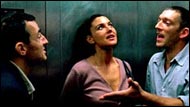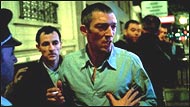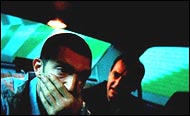Home > Movies > Reviews
Violence without cause?
Arthur J Pais |
March 15, 2003 15:48 IST
 Mention Irreversible and you may hear some movie buffs swear they will not go anywhere near it. The graphic rape scene which lasts over 10 minutes and the violence inflicted on gay men is horrendous, the won't see-crowd may argue.
Mention Irreversible and you may hear some movie buffs swear they will not go anywhere near it. The graphic rape scene which lasts over 10 minutes and the violence inflicted on gay men is horrendous, the won't see-crowd may argue.
There are those who have seen the film directed by Gaspar Noe and have concluded it was made by Lucifer.
And there are those who will argue it is a masterpiece, and that the violent scenes are well balanced with many of its tranquil moments that appear towards its end. Noe, they will say, is a master of nausea, a filmmaker with urgent things to say about the world around us.
One of the most discussed films of our times, Irreversible has played at many film festivals, including last year's Toronto International Film Festival, where hardly anyone clapped for it. Yet, it is a hit in Europe.
Some European and American critics consider Noe a very innovative and important filmmaker. But those who have condemned the film have done so with vigour and plenty of thought. 'I think you need this like a fire-extinguisher-shaped hole in the head,' wrote Peter Bradshaw in The Guardian.
American critics have been divided over the film, too.
While The New York Times, Los Angeles Times and New York Post slammed the movie for being pretentious, People, Rolling Stone and Entertainment Weekly loved it.
' Little more than Hollywood hardcore extremism,' declared LA Times in what I consider a very underplayed statement.
Little more than Hollywood hardcore extremism,' declared LA Times in what I consider a very underplayed statement.
Rolling Stone declared: 'Irreversible means to knock you for a loop. It does.'
Entertainment Weekly called the movie 'an amazing and profoundly disturbing experience.'
With all its brutality, violence and moments of quiet romance intact, the film is now being shown in a handful of American theatres. Lions Gate has released it without any rating, arguing it did not want to compromise the movie's quality by cutting out some of the violent scenes. I think it was a wise decision. Even to have an R-rating, at least half the movie might need to be sawed off.
The film moves at such a frenetic speed during the orgy of violence for the first 20 minutes that you may pray, like I did, that the camera would slow down.
You may regret making that wish.
For now, the almost still camera carefully records the rape scene in minute detail. Just when you think it is over, the rapist starts all over again.
Director Noe is not worried about the controversy his film has created and how many people have become sick after seeing it. He says the violence is meant to do precisely that. There is more violence, he has tried to argue, in Hollywood movies. Though it is far milder than in his film, Noe says since it is gratuitous, it is actually more violent.
 The movie tells its story in reverse. It focuses on Alex (Monica Bellucci), a beautiful woman who goes out partying with her boyfriend, Marcus (Vincent Cassel), and ex-boyfriend, Pierre (Albert Dupontel). Alex quarrels with Marcus at the end of the evening and decides to go home alone. She is raped in an underpass.
The movie tells its story in reverse. It focuses on Alex (Monica Bellucci), a beautiful woman who goes out partying with her boyfriend, Marcus (Vincent Cassel), and ex-boyfriend, Pierre (Albert Dupontel). Alex quarrels with Marcus at the end of the evening and decides to go home alone. She is raped in an underpass.
Marcus and Pierre go looking for the rapist, a gay pimp, and track him down at a gay S&M club. What follows is one of the most violent scenes in movie history. There is also the possibility a wrong man has been killed. The scenes shot in darkness for most part are not only scary and nauseating, especially the two dozen or so times a man is beaten with a fire extinguisher, but also confusing. Intentionally done, Noe might say.
The list of movies that deal with rape without this kind of brutality, yet are more effective, is quite substantial. Among my favourites is Two Women, one of the best works of director Vittorio De Sica with his favourite actress Sophia Loren in the 1960s.
Noe's worst failure is that we seldom get an opportunity to glimpse the horror in the victim's soul.